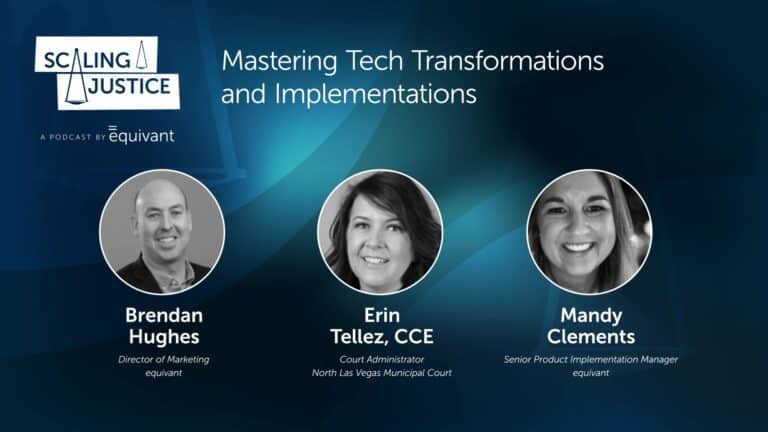In a case management system (CMS), identities (or persons listed in the database) allow a jurisdiction to track a person within their justice system. It sounds simple, but the data can become challenging to manage with people cycling through the system.
Delaware County Juvenile Court, an equivant client, has established effective identity management processes to get the most out of their CMS, increase efficiency, and reduce the number of duplicates in their system.
The Challenge with Identity Tracking—Duplicates and Incomplete Information
CMSs provide the functionality to track identities in addition to notifying the user of potential duplicates when a new identity is entered into the system. However, technology is only as effective as the data rules and processes established by its users. Many jurisdictions will create new identities despite the notification of a duplicate if the information in the CMS is not an exact match (e.g., if all identifiers match but the address is different). It can be easy to see how one or two instances of duplicate information can delay processes. But this problem can easily snowball into hundreds or even thousands of duplicates, causing a real headache for staff, judges, attorneys, defendants—really anyone in the system.
To prevent this from happening, jurisdictions must have a process in place to manage identities. This includes a process to avoid duplications for one identity and to retroactively identify duplications and consolidate them. Whenever procedures are put in place, training staff is essential for overall success.
Delaware County Juvenile Court’s Success
The Solution—Clear Processes with Continuous Enforcement
To manage and track identities efficiently while leveraging the benefits of a CMS, jurisdictions must implement and enforce processes. In Delaware County, anyone entering information is responsible for examining identity duplicates. When a complaint is filed in the Juvenile Division, it becomes the source of truth. When that information is received, they first use the name and date of birth to search for an existing profile. If they have the person’s social security number, they will also match using the last four digits. Occasionally, when the identifiers are missing, they search using soft factors such as address.
Once the case is created, the Triage Department then double-checks the name and any potential duplicated identities. If there appear to be any data entry issues, (e.g., misspelled names) information is confirmed and corrected during an official court hearing and goes on the record. Any unverified information, such as addresses, is mentioned in the case notes.
When duplicates are identified in the system, only a few select staff members have the authority to consolidate. The staff member who finds the duplicate will identify which should be kept and submit a request for assistance. Then, the staff member responsible for consolidations double-checks all information again before proceeding. To avoid changing identities outside the Juvenile Division, Juvenile uses title case while other divisions use all caps.
The Results
By implementing identity management processes, Delaware County Juvenile Court has seen many positive impacts across its jurisdiction. Information is provided promptly and is accurate and up to date. Duplicates have been reduced notably, resulting in less confusion. Additionally, tracking the legal journey has become easier since case information isn’t spread across multiple identities.
Delaware County’s Process to Overcome Identity Tracking Challenges Provides a Blueprint for Others
Delaware County’s success can provide a guide to other justice agencies facing similar challenges. To start implementing effective identity management processes in your jurisdiction, you’ll need to consider how data will be entered into the system and who can make changes and consolidations.
Data Entry Processes
Deciding how, what, and when data are entered into the system can be overwhelming. Processes will vary by jurisdiction, but answering these questions is an excellent place to start:
- What is the source of truth that can indicate changes to identity information?
- What information is used to match the person?
- When do you search identities before creating new ones?
- When do you make a new identity?
- Who is responsible for exploring if there are duplicate identities?
Security
Things can become messy if too many people in your jurisdiction can change identity information. Similarly to Delaware County Juvenile Court, you’ll need to establish select individuals with decision-making and editing power to ensure your processes are effective. Consider these questions:
- Who has access to what information (e.g., who should have access for their division only versus other divisions)?
- Who can change identity information (e.g., correct misspellings, update address)?
- Who can consolidate identities?
Finally, make sure to leverage all technology capabilities from your CMS to find, identify, and alert users to possible duplicates. Technology can be powerful in managing identities effectively and reducing duplicates (automations, triggers, and alerts), but it is most effective after establishing data entry rules and processes.
Interested in exploring other tips to make your court more efficient? Read our whitepaper.





